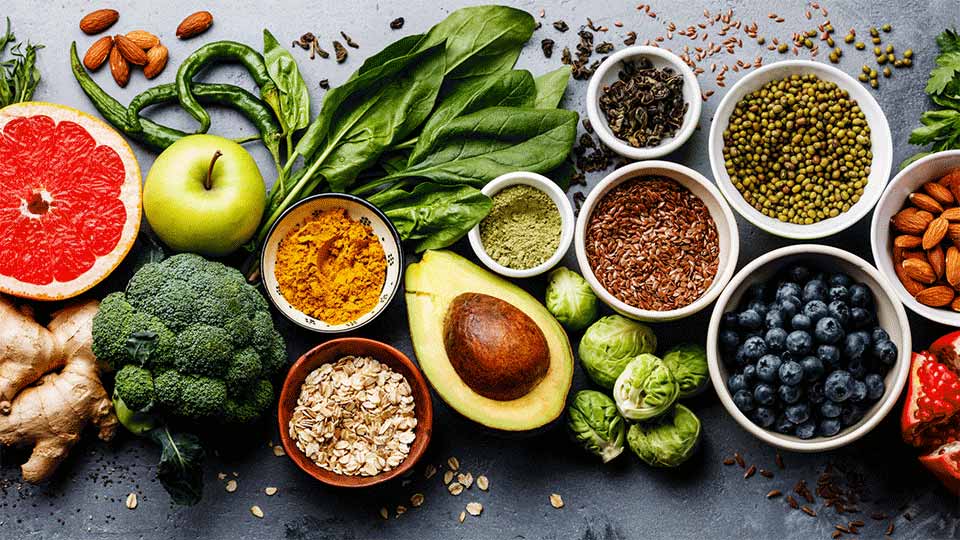The Role of Superfoods in Boosting Immunity and Overall Health

In recent years, the concept of “superfoods” has gained widespread popularity, particularly as health-conscious individuals seek natural ways to enhance their well-being. These nutrient-rich foods, often hailed for their extraordinary health benefits, are seen as key to boosting immunity, reducing the risk of chronic diseases, and promoting overall health. But what exactly are superfoods, and how do they impact our immune system and general health? This article delves into the science behind superfoods, their role in immune health, and why incorporating them into your diet can lead to a healthier life.
What Are Superfoods?
Superfoods are foods that are exceptionally high in nutrients, such as vitamins, minerals, antioxidants, and phytochemicals. While there is no scientific definition of superfoods, the term generally refers to natural, whole foods that provide significant health benefits beyond their basic nutritional value.
Superfoods include a wide range of foods, from fruits and vegetables to nuts, seeds, and fish. Some of the most common superfoods include berries, leafy greens, turmeric, garlic, ginger, chia seeds, quinoa, and fatty fish like salmon. These foods are celebrated for their ability to enhance health, improve longevity, and provide protection against various diseases.
The Immune System and Its Importance
The immune system is the body’s defense mechanism against harmful pathogens, including bacteria, viruses, and other foreign invaders. It consists of a complex network of cells, tissues, and organs that work together to identify and destroy harmful substances. A strong immune system is essential for maintaining health and preventing infections, while a weakened immune system can leave the body vulnerable to illness and disease.
Diet plays a crucial role in maintaining and strengthening the immune system. Nutrient deficiencies, particularly in vitamins and minerals like Vitamin C, Vitamin D, zinc, and selenium, can impair immune function and increase susceptibility to infections. This is where superfoods come into play—they provide essential nutrients and bioactive compounds that support immune health and enhance the body’s natural defense mechanisms.
How Superfoods Boost Immunity
1. Rich in Antioxidants
One of the key reasons superfoods are celebrated for their immune-boosting properties is their high antioxidant content. Antioxidants are compounds that neutralize free radicals—unstable molecules that can damage cells and contribute to aging and disease. Free radical damage, also known as oxidative stress, is linked to chronic conditions such as cancer, heart disease, and autoimmune disorders.
Berries, such as blueberries, strawberries, and acai berries, are particularly rich in antioxidants like vitamin C, anthocyanins, and flavonoids. These compounds not only protect cells from damage but also enhance the function of immune cells, making the body more resilient to infections.
2. Anti-Inflammatory Properties
Chronic inflammation is a key driver of many diseases, including heart disease, diabetes, and autoimmune conditions. Superfoods like turmeric, ginger, and fatty fish are known for their potent anti-inflammatory effects. Turmeric contains curcumin, a compound with powerful anti-inflammatory and antioxidant properties. Studies have shown that curcumin can modulate immune responses, reducing inflammation and boosting the body’s ability to fight infections.
Similarly, omega-3 fatty acids found in fatty fish like salmon and mackerel are known to reduce inflammation in the body. These healthy fats not only improve heart health but also enhance immune function by regulating inflammatory responses, thereby reducing the risk of chronic diseases.
3. High in Essential Vitamins and Minerals
Superfoods are nutrient-dense and provide a wealth of vitamins and minerals that are critical for immune function. For instance:
- Vitamin C is essential for the production of white blood cells, which are the body’s first line of defense against infections. Foods like oranges, kiwis, bell peppers, and strawberries are excellent sources of vitamin C.
- Vitamin D is crucial for immune regulation and the activation of immune cells. Fatty fish, fortified dairy products, and sunlight exposure are the best sources of vitamin D.
- Zinc is important for the development and function of immune cells. Foods like nuts, seeds, and legumes are rich in zinc, making them ideal for supporting immune health.
Other minerals, such as selenium and magnesium, also play a role in maintaining a healthy immune system by supporting antioxidant defense and cellular repair.
4. Support Gut Health
A large portion of the immune system resides in the gut, where beneficial bacteria (probiotics) play a key role in defending the body against harmful pathogens. Superfoods like yogurt, kefir, and fermented foods (such as sauerkraut and kimchi) are rich in probiotics, which help maintain a healthy gut microbiome. A balanced gut flora enhances immune function, reduces inflammation, and improves the body’s ability to fend off infections.
Prebiotic foods, such as garlic, onions, and bananas, provide nourishment for these beneficial bacteria, promoting a healthy gut environment. Together, probiotic and prebiotic superfoods support both digestive and immune health.
Superfoods and Overall Health
Beyond boosting immunity, superfoods offer numerous health benefits that contribute to overall well-being. Here are some ways in which they support a healthy lifestyle:
1. Heart Health
Many superfoods, such as berries, nuts, seeds, and fatty fish, are known to promote heart health by reducing cholesterol levels, lowering blood pressure, and improving circulation. Omega-3 fatty acids, in particular, are known to reduce the risk of heart disease by preventing inflammation and improving blood vessel function. Antioxidants in berries help prevent the oxidation of LDL cholesterol, a key factor in the development of heart disease.
2. Weight Management
Superfoods are typically low in calories but high in nutrients, making them ideal for weight management. Foods like leafy greens, chia seeds, and quinoa are rich in fiber, which promotes feelings of fullness and reduces overall calorie intake. Fiber also supports digestive health and helps regulate blood sugar levels, reducing the risk of obesity and type 2 diabetes.
3. Cognitive Health
Several superfoods have been shown to support brain health and cognitive function. Blueberries, for example, contain antioxidants that protect brain cells from oxidative damage and improve memory and cognitive performance. Fatty fish, rich in omega-3 fatty acids, are essential for brain health and may reduce the risk of neurodegenerative diseases like Alzheimer’s.
4. Cancer Prevention
Certain superfoods contain compounds that have been linked to cancer prevention. Cruciferous vegetables like broccoli, kale, and Brussels sprouts contain sulforaphane, a compound that has been shown to have anticancer properties by inhibiting the growth of cancer cells. Green tea is another superfood that contains polyphenols, which have antioxidant and anticancer effects.
Incorporating Superfoods Into Your Diet
Adding superfoods to your daily diet is a simple and effective way to boost immunity and improve overall health. Here are some tips for incorporating them into your meals:
- Start your day with a smoothie: Blend a handful of spinach or kale with berries, chia seeds, and a spoonful of yogurt for a nutrient-packed breakfast.
- Snack on nuts and seeds: Almonds, walnuts, and sunflower seeds are easy to carry and provide a healthy dose of essential nutrients.
- Add spices like turmeric and ginger: These potent anti-inflammatory superfoods can be added to soups, stews, or teas for a health boost.
- Incorporate fatty fish: Aim to eat fatty fish like salmon, mackerel, or sardines at least twice a week for a good dose of omega-3s.
Conclusion
Superfoods play an integral role in boosting immunity and enhancing overall health. Rich in antioxidants, anti-inflammatory compounds, and essential vitamins and minerals, these nutrient-dense foods offer powerful protection against disease and support various aspects of health, from heart and brain function to weight management and cancer prevention. By incorporating a variety of superfoods into your diet, you can strengthen your immune system and improve your quality of life.

